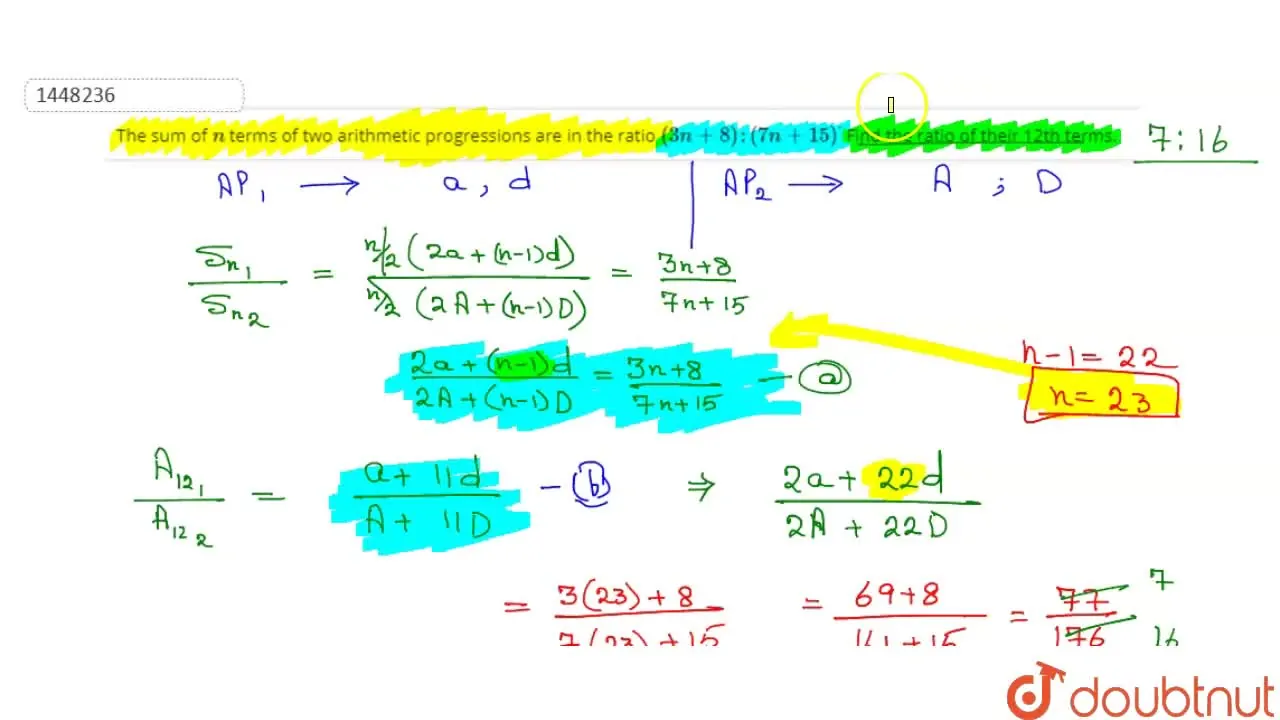The sum of n terms of two arithmetic progressions are in the ratio (3n+8):(7n+15). Find the ratio of their 12th terms.
The correct Answer is:7:16
Step by step video, text & image solution for The sum of n terms of two arithmetic progressions are in the ratio (3n+8):(7n+15)dot Find the ratio of their 12th terms. by Maths experts to help you in doubts & scoring excellent marks in Class 10 exams.
Related Playlists
- BOOK - RS AGGARWALCHAPTER - ARITHMETIC PROGRESSIONEXERCISE - Exercise 5D27videos
ARITHMETIC PROGRESSION
- BOOK - RS AGGARWALCHAPTER - ARITHMETIC PROGRESSIONEXERCISE - Multiple Choice Questions (Mcq)30videos
ARITHMETIC PROGRESSION
- BOOK - RS AGGARWALCHAPTER - ARITHMETIC PROGRESSIONEXERCISE - Exercise 5B13videos
ARITHMETIC PROGRESSION
- BOOK - RS AGGARWALCHAPTER - AREA OF CIRCLE, SECTOR AND SEGMENT EXERCISE - Test Yourself19videos
AREA OF CIRCLE, SECTOR AND SEGMENT
- BOOK - RS AGGARWALCHAPTER - CIRCLESEXERCISE - Test Yourself20videos
CIRCLES
Similar Questions
The sum of n terms of two arithmetic progressions are in the ratio (3n+8):(7n+15). Find the ratio of their 12th terms.
View Solution(i) The sum of n terms of two arithmetic series are in the ratio of 7n+14n+27. Find the ratio of their 11 th terms.
(ii) The sum of n terms of arithmetic progressions are in the ratio(3n+8):(7n+15). Find the ratio of their 12 th terms.View SolutionThe sums of n terms of two arithmetic progresssions are in the ratio (7n+1):(4n+17). Find the ratio of their nth terms and also common differences.
View SolutionThe sums of n terms of two arithmetic progressions are in the ratio 5n+4:9n+6. Find the ratio of their 18thterms.
View SolutionThe sum of n terms of two arithmetic progressions are in the ratio 5n+4:9n+6. Find the ratio of their 18th terms.
View SolutionThe sum of n terms of two arithmetic progressions are in the ratio 5n+4: 9n+6. Find the ratio of their 18th terms.
View SolutionThe sum of n terms of two arithmetic progressions are in the ratio 2n+3:6n+5, then the ratio of their 13th terms, is
View SolutionIf the sums of n terms of two arithmetic progressions are in the ratio 2n+5:3n+4, then write the ratio of their mth term.
View SolutionThe sum of n terms of two arithmetic series are in the ratio of (7n+1):(4n+27). Find the ratio of their nth term.
View SolutionThe ratio of the sum of n terms of two arithmetic progressions is given by (2n+3):(5n−7). Find the ratio of their nth terms.
View Solution


